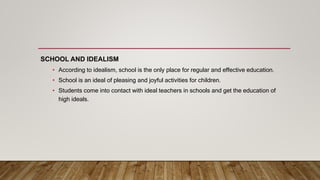IDEALISM AND EDUCATION.pptx
- 1. IDEALISM AND EDUCATION DR. SANJAY KUMAR ASSISTANT PROFESSOR {EDUCATION} UNIVERSITY OF LADAKH, KARGIL CAMPUS
- 2. INTRODUCTION IDEALISM ISTHE ANCIENTWESTERN PHILOSOPHY ŌĆó It is thatschool ofwesternphilosophywhich considers; ŌĆó This universeis created by god. ŌĆó Spiritual world is superior to material world. ŌĆó God is theultimate reality and soul is the part of god. ŌĆó Ultimate aim of humanlifeis self-realization, which is achieved by moral laws.
- 3. EXPONENTS ŌĆó Propounders of Idealism is Plato. ŌĆó Other chief Exponents of Idealism are as follows; ŌĆó Socrates -----Kant ŌĆó M.k.Gandhi ------- Hegel ŌĆó Swami Vivekananda ----Shankar Acharya ŌĆó Aurobindo Ghosh ---- Green ŌĆó Radhakrishanan -----Fitche ŌĆó Swami Dayananda Saraswati ----- Barkley ŌĆó Froebel ------Spinoza
- 4. FUNDAMENTAL PRINCIPLES OF IDEALISM ŌĆó This universe is created by god ŌĆō ŌĆó Spiritual world is superior to material world ŌĆó Man is the best creation of the world. ŌĆó Ultimate aim of human life is self-realization. ŌĆó Truth, goodness and beauty is essential for self-realization.
- 5. AIMS OF EDUCATION Ultimate aim is to know form of soul and God. ŌĆó Man has to cross 4 stages to know this- Develop natural self. Develop social self. Intellectual self. Spiritual development. ŌĆó Cultural development. ŌĆó Conservation, promotion and transmission of cultural heritage. ŌĆó Realization of truth, goodness and beauty.
- 6. CURRICULUM OF EDUCATION Intellectual activities Moral activities Aesthetic activities ŌĆó Mathematics ŌĆó Language ŌĆó Literature ŌĆó History ŌĆó Science ŌĆóTheology ŌĆóEthics ŌĆóSpiritual topics ŌĆóArt ŌĆóMusic
- 7. METHODS OF TEACHING Idealists havenot adopted anyspecific or definite method of teaching. Theyadvocated manymethods. Theythinkthemselves ascreatorof methods andnotslave of anyparticularmethod. ŌĆó Idealists prescribe the following methods of teachingŌĆō ŌĆó Ō×ó Instructionmethod ŌĆō Herbart Ō×ó Conversationmethod ŌĆō Plato Ō×ó Logical method ŌĆō Hegel Ō×ó Practiceand repetitionmethod ŌĆō Pestalozzi Ō×ó Play-waymethod ŌĆō Froebel Ō×ó Inductive& deductive methods ŌĆō Aristotle
- 8. DISCIPLINE AND IDEALISM ŌĆó Idealism believes in inner discipline. ŌĆó Freedom of child should be restricted. ŌĆó Human behavior should have internal control rather than external one like praise and punishment. ŌĆó Emphasize on impressionistic discipline.
- 9. TEACHER AND IDEALISM ŌĆó Role of teacher is supreme and important. ŌĆó Teacher helps in moral & spiritual development. ŌĆó Teacher is pivot (centre) of the education process. ŌĆó In Indian idealism, teacher has been considered equal to 3 gods (tri-dev).
- 10. SCHOOL AND IDEALISM ŌĆó According to idealism, school is the only place for regular and effective education. ŌĆó School is an ideal of pleasing and joyful activities for children. ŌĆó Students come into contact with ideal teachers in schools and get the education of high ideals.










